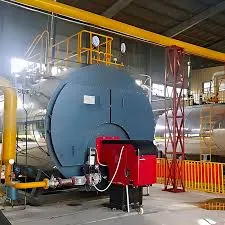
Dec . 20, 2024 13:37 Back to list
thermal fluid boiler
Understanding Thermal Fluid Boilers A Comprehensive Overview
Thermal fluid boilers are pivotal in various industrial processes, providing efficient and reliable heating through the use of thermal fluids instead of conventional steam. These boilers utilize high-temperature heat transfer fluids, often referred to as thermal oils or heat transfer oils, to facilitate the heating process in applications ranging from food processing to chemical manufacturing. This article delves into the working principles, benefits, applications, and maintenance of thermal fluid boilers.
Working Principle
The primary function of a thermal fluid boiler is to heat a thermal fluid to a specified temperature, which then circulates through a system to transfer heat to the required processes. Unlike traditional steam boilers, which produce steam and operate at high pressure, thermal fluid systems operate at lower pressures, significantly reducing the risk of leaks or failures.
The thermal fluid is heated in a closed loop via an indirect heat exchanger or directly within the boiler. As the thermal fluid circulates through the system, it absorbs heat from the boiler and transfers it to various end-use applications. Upon releasing its heat, the fluid returns to the boiler for re-heating, creating a continuous cycle.
Benefits of Thermal Fluid Boilers
1. High Efficiency Thermal fluid systems are known for their high thermal efficiency. They can maintain a stable temperature, allowing users to achieve optimal performance in their heating applications.
2. Versatility These boilers can be used for a variety of processes, including drying, distillation, and heating, making them suitable for diverse industries such as pharmaceuticals, textiles, and food processing.
3. Lower Operating Pressures Operating under lower pressure means reduced risks associated with pressure vessel regulations and enhances overall safety during operation.
4. Minimal Maintenance With fewer moving parts compared to traditional steam boilers, thermal fluid systems require less maintenance. The simple design leads to lower costs and reduced downtime for repairs.
5. Heat Distribution Thermal fluid boilers facilitate excellent heat distribution, enabling precise temperature control across process lines. This characteristic is crucial for industries requiring strict thermal regulation.
thermal fluid boiler

Applications
Thermal fluid boilers find applications across various sectors, including
- Chemical Processing In chemical manufacturing, heat is often required for reactions, distillations, and other processes. Thermal fluid systems provide the necessary heating efficiently and safely.
- Food and Beverage Industry The food industry employs thermal fluid heating systems for cooking, pasteurizing, and drying food products. This method ensures uniform heating and preserves food quality.
- Textile Industry Thermal fluid boilers are utilized in dyeing, drying, and finishing processes, providing the necessary heat without the risks associated with steam.
- Pharmaceutical Manufacturing In this sector, precise control of temperature is crucial for the effective production of medications. Thermal fluid systems offer the reliability and accuracy required for these sensitive processes.
Maintenance and Safety
Maintaining a thermal fluid boiler is integral to its longevity and operational efficiency. Regular inspections should focus on checking fluid levels, monitoring fluid quality, and ensuring the integrity of the heat transfer system. It is also essential to monitor the temperature and pressure levels to prevent overheating.
Safety protocols must be established, including proper ventilation and regular system checks to detect leaks or degradation of the thermal fluid. Furthermore, using high-quality thermal oils specifically designed for the intended temperature range can enhance the system's overall performance and safety.
Conclusion
Thermal fluid boilers represent a sophisticated approach to industrial heating, offering numerous advantages over traditional steam boilers. Their efficiency, versatility, and lower operating pressures make them an ideal choice for many industries. Understanding their functionality and maintenance is crucial for maximizing their benefits and ensuring safety in industrial operations. As technology continues to advance, thermal fluid boilers are likely to become even more integral to modern manufacturing processes, demonstrating their importance in the industrial landscape.
-
High-Efficiency Commercial Oil Fired Steam Boiler for Industry
NewsJul.30,2025
-
High-Efficiency Biomass Fired Thermal Oil Boiler Solutions
NewsJul.30,2025
-
High Efficiency Gas Fired Thermal Oil Boiler for Industrial Heating
NewsJul.29,2025
-
High-Efficiency Gas Fired Hot Water Boiler for Sale – Reliable & Affordable
NewsJul.29,2025
-
High Efficiency Biomass Fired Hot Water Boiler for Industrial and Commercial Use
NewsJul.29,2025
-
High-Efficiency Biomass Fired Hot Water Boiler for Industrial Use
NewsJul.28,2025
Related PRODUCTS






















